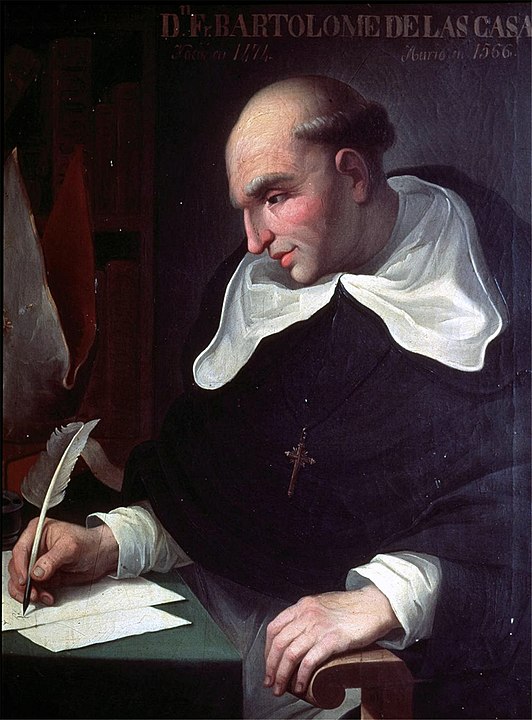
Bartolomé de las Casas
Born: November 11, 1484
Died: July 18, 1566
Feast day: July 18
If Christopher Columbus had known what he was unleashing when he brought Pedro de las Casas with him to the New World in 1493, he probably would have sailed the gentleman back to Spain and made sure that no member of his family ever set foot on a ship again.
But Señor de las Casas, a Spanish merchant of good stock, stepped ashore safely, as would his 18-year-old son Bartolomé nine years later, in 1502.
This young man, who would one day bear the title “Protector of the Indians,” joined the conquistadores in founding settlements in Cuba and was given a large estate with plenty of enslaved Native Americans to work it. Although ordained to the priesthood in 1507, he later admitted that he excelled more at making enslaved people work than at teaching them the Christian faith. He might have agreed with another young Spaniard of the era, who said, “We came here to serve God and the king, and also to get rich.”
Some had tried to awaken his conscience on the issue of Native American slavery. Several Dominican priests had thundered from the pulpit against the horrific mistreatment of the Native Americans, and one of them had refused to give Las Casas absolution because he held enslaved Native American people.
Finally, in 1514, something snapped. Las Casas was preparing to preach a Pentecost sermon when he caught sight of Ecclesiasticus 34:18: “Stained is the offering of him that sacrificeth from a thing wrongfully gotten.” After pondering this text for several days, he began to see the treatment of the Native Americans with clear eyes. In the following weeks he gave up his enslaved people, sold his estate, and began to preach about his change of heart, no doubt stunning his fellow Spaniards.
Bartolomé de las Casas spent the next 50 years of his life with a single purpose: to fight for justice for the peoples of the New World. When he realized his sermons in Cuba were falling on deaf ears, he returned to Spain to present his case directly to the king. It was a strategy he would continue until his death, bending the ear of each new Spanish ruler who took the throne.
Las Casas made a number of missteps along the way. His plan to found a utopian farming community in Venezuela ended in disaster, prompting Las Casas to join the Dominican order and retreat from public life for nearly ten years. Early on he also suggested that African enslaved people born in Spain be brought to the New World to prevent the enslavement of the Native Americans, a position which he later retracted.
By 1542, Las Casas, now the official “Protector of the Indians,” had succeeded in pushing through the “New Laws” in Spain, which prohibited slavery of Native Americans and ordered that no Spaniard could pass on his Native American laborers to future generations. Although these restrictions were hard to enforce and were later weakened, they did offer some minimal protection to the Native Americans.
Las Casas, never one to rest one to rest on his laurels, continued to urge greater reforms, even insisting that no Spanish landowner could be absolved in confession without making restitution to the Native Americans. Most Spaniards considered this position completely preposterous.
Biographer Helen Rand Parish describes him, well into his eighties, still “beating his head against a stone wall, demanding total reform, pointing his finger at the King.” He would never achieve his goal, but neither would he abandon it.
Originally published in the October 1992 issue of Salt magazine, ©Claretian Publications.
Image: Unidentified painter, National Geographic & Álvaro Huerga, Bartolomé de Las Casas: Vie et œuvres., Public Domain, via Wikimedia Commons






